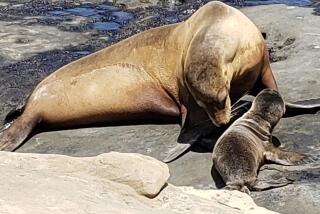Frustration Did Sierra Club Chief In, Officials Say
- Share via
Douglas P. Wheeler, who has resigned as executive director of the Sierra Club after only 16 months on the job, quit because of frustration with the club’s cumbersome decision-making process and the demands of having to be both a highly visible environmental leader nationally and an administrator, club officials said Monday.
Wheeler’s resignation, accepted by directors on an 8-7 vote, was announced in a weekend press release that offered no explanation for the move, other than to say that Wheeler, 44, wished “to pursue other interests in the fields of conservation and philanthropy.” He succeeded J. Michael McCloskey as executive director on July 1, 1985. McCloskey, who continued as chairman, has agreed to return to his old job until a replacement is found.
On Monday, club officials said that Wheeler had become increasingly disenchanted with the job. Wheeler, an attorney who was president of the American Farmland Trust before taking the top post at the Sierra Club, could not be reached Monday for comment.
“I think it comes down in some ways to a question of fit and comfort,” said Douglas W. Scott, club conservation director. “On external things, he did an excellent job in representing the club with leaders of other conservation groups, with the Congress, with key officials.”
But Scott, as well as several other club officials, including political director Carl Pope, club spokeswoman Joanne Hurley and Angeles chapter chairman Eldon Hughes, said Wheeler did not foresee the intricacies of a large organization that encompasses both large numbers of volunteers, a paid staff of 200 at the San Francisco headquarters, 11 regional offices and a defused decision-making structure that involves both volunteers and the club’s 57 local chapters.
“This is a very complex and unique organization. There is a mix of volunteers and paid staff. The fact this organization is owned, in a way that is quite unique, by volunteer members and leaders means the role of a chief executive officer is more complex than in many kinds of organizations. The CEO doesn’t set the agenda,” Scott said.
For example, at a time when the club was beset by budgetary constraints, Wheeler was unable to effect cost savings quick enough to suit him, Scott said. Instead, budget proposals, including one that would have cut allocations to the club’s local chapters, were referred to committees for review and to build consensus.
The club, with an annual budget of $23 million, has been confronted with higher operating expenses and lower revenues from such activities as mountain climbing, white-water river trips and overseas excursions because of skyrocketing premiums being charged by insurance companies for liability policies.
During the club’s last fiscal year, which ended Sept. 30, spending exceeded budgeted income by $300,000. The club dipped into reserves to cover the difference.
“It just wasn’t exactly the job that Doug thought he was getting into when he accepted it. There was a lot more involved, some very complex kinds of situations,” spokeswoman Hurley said.
“There was tension about his role in terms of some things, what his priorities were and where he spent his own time. He’s been playing the external role very heavily and people have been pleased. But, I take it there was some discontent on his part to move things internally,” Pope said Monday.
“There are two facets to the job. He expected one job and two came,” said Hughes of the 47,000-member Angeles chapter--the club’s largest--based in Los Angeles and Orange counties.
More to Read
Sign up for Essential California
The most important California stories and recommendations in your inbox every morning.
You may occasionally receive promotional content from the Los Angeles Times.













